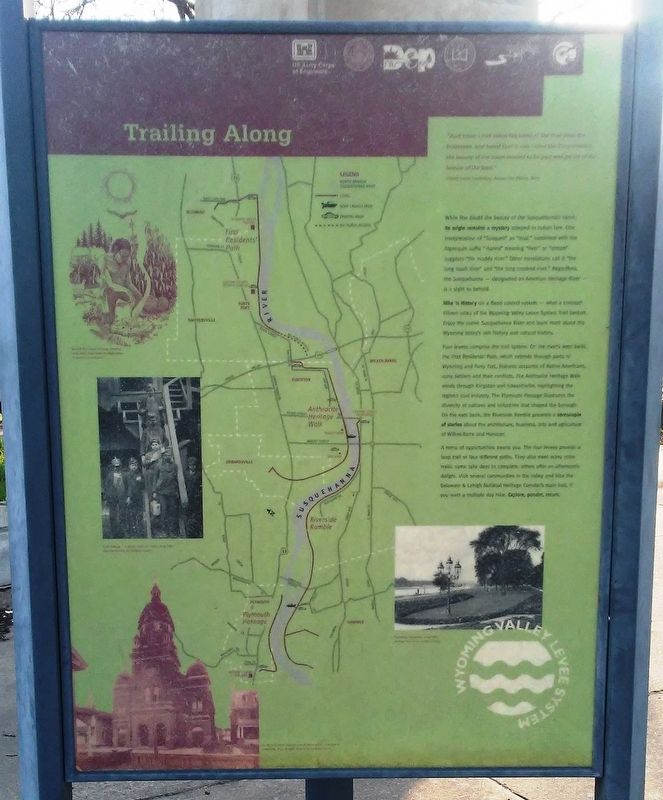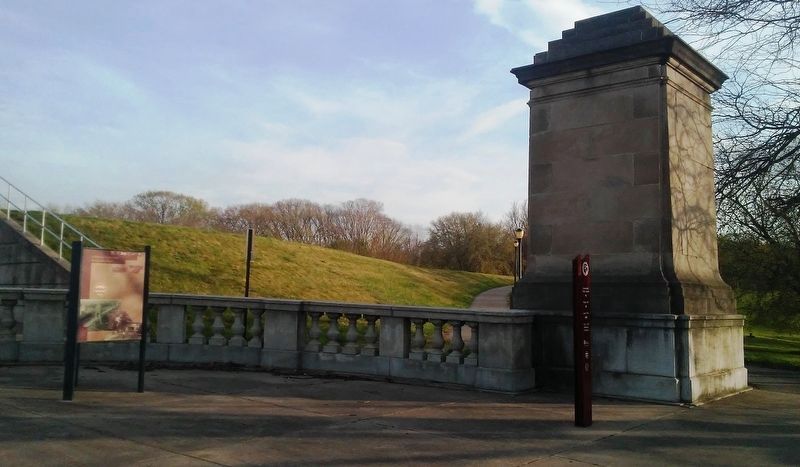Trailing Along
Wyoming Valley Levee System
"And when I had asked the name of the river from the brakeman, and heard that it was called Susquehanna, the beauty of the name seemed to be part and parcel of the beauty of the land."
Robert Louis Stevenson, Across the Plains, 1879
While few doubt the beauty of the Susquehanna's name, its origin remains a mystery steeped in Indian lore. One interpretation of "Susqueh" as "mud," combined with the Algonquin suffix "-hanna" meaning "river" or "stream" suggests "the muddy river." Other translations call it "the long reach river" and "the long crooked river." Regardless, the Susquehanna — designated an American Heritage River — is a sight to behold.
Hike 'n History on a flood control system — what a concept! Fifteen miles of the Wyoming Valley Levee System Trail beckon. Enjoy the scenic Susquehanna River and learn more about the Wyoming Valley's rich history and natural history.
Four levees comprise the trail system. On the river's west bank, the First Residents' Path, which extends through parts of Wyoming and Forty Fort, features accounts of Native Americans, early settlers and their conflicts. The Anthracite Heritage Walk winds through Kingston and Edwardsville, highlighting the region's coal industry. The Plymouth Passage illustrates the diversity of cultures and industries
that shaped the borough. On the east bank, the Riverside Ramble presents a cornucopia of stories about the architecture, business, arts and agriculture of Wilkes-Barre and Hanover.A menu of opportunities awaits you. The four levees provide a loop trail or four different paths. They also meet many other trails: some take days to complete, others offer an afternoon's delight. Visit several communities in the valley and hike the Delaware & Lehigh National Heritage Corridor's main trail, if you want a multiple day hike. Explore, ponder, return.
[Levee Trails system map]
[Illustrations, top to bottom, left to right, read]
• Native American tobacco burning ceremony
• Coal mining - a job for men and boys, circa 1900
• St. Mary's Polish Church, one of many ethnic churches in Plymouth, 1918.
• The River Commons, circa 1900
Erected by Delaware & Lehigh National Heritage Corridor and Others.
Topics. This historical marker is listed in these topic lists: Man-Made Features • Native Americans • Parks & Recreational Areas • Waterways & Vessels. A significant historical year for this entry is 1879.
Location. 41° 15.075′ N, 75° 53.247′ W. Marker is in Kingston, Pennsylvania, in Luzerne County. Marker is at the intersection of Market Street
Other nearby markers. At least 8 other markers are within walking distance of this marker. A Formal Promenade Across the River (here, next to this marker); What on Earth is a Levee? (here, next to this marker); a different marker also named Trailing Along (within shouting distance of this marker); Bridging Two Cities (within shouting distance of this marker); a different marker also named What on Earth is a Levee? (within shouting distance of this marker); War Memorial (within shouting distance of this marker); Wilkes-Barre (about 600 feet away, measured in a direct line); 109th Field Artillery Battalion Memorial (approx. ¼ mile away). Touch for a list and map of all markers in Kingston.
More about this marker. An identical marker is northeast across Market Street.
Also see . . .
1. Wyoming Valley Levee System (The Citizens' Voice, 2012). (Submitted on May 6, 2018, by William Fischer, Jr. of Scranton, Pennsylvania.)
2. Luzerne County Levee Trail. (Submitted on May 6, 2018, by William Fischer, Jr. of Scranton, Pennsylvania.)
3. Delaware & Lehigh National Heritage Corridor. (Submitted on May 6, 2018, by William Fischer, Jr. of Scranton, Pennsylvania.)
Credits. This page was last revised on August 9, 2020. It was originally submitted on May 6, 2018, by William Fischer, Jr. of Scranton, Pennsylvania. This page has been viewed 109 times since then and 4 times this year. Photos: 1, 2. submitted on May 6, 2018, by William Fischer, Jr. of Scranton, Pennsylvania.

